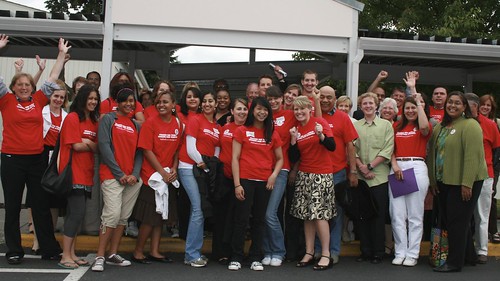African American Achievement Gap Advisory Committee meeting recap
Posted by Heather
The African American Achievement Gap Advisory Committee (created by HB 2722) met at UW-Tacoma yesterday. The main attraction of the meeting was Paul Ruiz of The Education Trust. Mr. Ruiz is one of EdTrust’s experts on the achievement gap, and brought along the latest version of “Education Watch: Washington.” You can read the 2006 version here.
Mr. Ruiz made a number of interesting and thought-provoking points during his presentation to the committee. Here are some of the highlights:
- Not all kids learn the same way, but all should learn to “respectable levels.”
- Kids should leave high school with ability to pursue options (college, trades, etc).
- When looking at NAEP and WASL scores, Washington is telling two different stories about proficiency (Of 4th graders, 77 percent passed the 2007 Reading WASL, compared to 37 percent scoring proficient or higher on NAEP).
- The faculty of low-income/high-minority schools should mirror the faculty at affluent schools (meaning our teacher workforce should be more equally distributed).
- We shouldn’t force teachers to teach where they don’t want to go, but the Legislature can set money aside to be used by high-poverty schools as incentives to attract teachers.
- In order to improve student achievement, the Committee (and State) should set goals and then allow districts and schools to figure out to meet those goals.
After a brief Q-and-A session with Mr. Ruiz, the Committee broke for a working lunch to discuss the efforts of its three workgroups.
Next, we heard from Janell Newman (of OSPI) and Dan Barkley about district and school improvement and accountability. Dr. Newman and Mr. Barkley gave a presentation on Washington schools in improvement steps (as defined under No Child Left Behind) and how the State works with some of those schools. In the data recently released by OSPI, we learned 628 schools (of 2,115) are in an improvement step. This is up from 280 schools last year and 180 schools in 2005. And while OSPI only has the resources to help about 100 schools, they were able to make progress with those schools.
The big challenge here is the State cannot intervene in schools in improvement steps unless it is asked. If all goes well with the State Board of Education, Washington will have a new accountability system that gives the State the ability to intervene when schools are struggling. To learn more about the effort of the SBE, click here.
The Committee ended by reviewing its interim report, due next week. These are typically status reports, and the Committee seems on track to meet its final draft deadline in December.
 Boarding a bus at seven in the morning to attend a State Board of Education meeting was not at the top of my summer to-do list. Honestly, I would have never guessed that attending a State Board of Education meeting would ever be on my calendar.
Boarding a bus at seven in the morning to attend a State Board of Education meeting was not at the top of my summer to-do list. Honestly, I would have never guessed that attending a State Board of Education meeting would ever be on my calendar.
